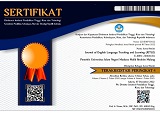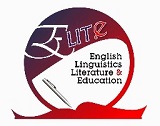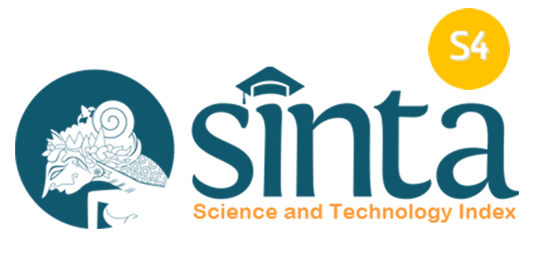Webquest : The Transformation and Innovation in ELT
Abstract
This paper aims at describing the use of modern technology for language teaching.The idea of webquest in language teaching has had colossal changes in recent decades. Advancements in technology, the prominence of the internet and its simple accessibility in numerous parts of the world has made a suitable device for teacher improvement. Web based media place new requests with respect to language which can advance varieties in language utilized (Halliday, 1990). The core issue of this paper will surely encourage the language teachers to find out the interesting and beneficial method of teaching and learning in the academic English classroom. Thus, the use of webquest in language teaching is one effective tool to promote variations in language teaching. The five main components of Webquest, namelythe introduction, task, process, resources, evaluation, and conclusion are significatlyinnovative teaching and learning strategies in EFL context.
Full Text:
PDFReferences
Bennett, S., Maton, K., & Kervin, L. (2008). The ‘digital natives’ debate: A critical review of the evidence. British Journal of Educational Technology, 39(5), 775–86. https://doi.org/10.1111/j.1467-8535.2007.00793.x
Budianto, Langgeng. (2008). Learner Autonomy with Technology: An Approach. Jurnal Sejarah dan Budaya, Universitas Negeri Malang.
Brandl, K. (2002). The Integration of Internet-Based Reading Materials into the Foreign Language Curriculum from Teacher to Students-Centered Approaches. Language Learning and Technology.
Bull, S., & Ma, Y. (2001) Raising learner awareness of language learning strategies in situations of limited recourses. Interactive Learning Environments, 9(2), 171-200. doi: 10.1076/ilee.9.2.171.7439
Dodge, B. 1997. Some Thoughs about Webquest (Electronic Version). Retrieved March 3, 2006 from http:webquest.sdsu.edu/about.webquest.htlm
Eady, M. J., & Lockyer, L. (2013). Tools for learning: technology and teaching strategies: Learning to teach in the primary school. Queensland University of Technology, Australia. pp. 71-89.
Frazee, J.P. (2004). Webquest Design Strategies. A Case Study Measuring the Effective of digsow Method on Students’ Pesonal Agency Belief, Engagement and Learning. UnpublishedDoctoral Dissertation. San Diego State University, San Diego.
Gençlter, B. (2015). How does technology affect language learning process at an early age? Procedia - Social andBehavioral Sciences, 199(2015), 311 – 316. doi: 10.1016/j.sbspro.2015.07.552
Harmer, J. (2007). The practice of English language teaching. England: Pearson. www.worldcat.org/title/practice-ofenglish-language-teaching/oclc/149005881
Jarvis, H. 2005. Technology and Change in English Language Teaching (ELT). Asian EFL Journal.
Kranthi, K. (2017). Technology Enhanced Language Learning (TELL). International Journal of Business and Management Invention. 6 (2). 14
King, K. (2003). The Webquest as a Means of Enhancing Computer Efficacy. Retrieved May 1, 2008. From Eric data base.
March, 2005. Webquest for Learning. Retrived June 18,2005, from www.ozline.com.webquest/introhtml
Organization for Economic Co-operation and Development (OECD). (2010). Are the new millennium learners making the grade? Technology use and educational performance in PISA: Centre for Educational Research and Innovation, OECD.
Sabzian, F., Pourhossein Gilakjani, A., & Sodouri, S. (2013). Use of technology in classroom for professional development. Journal of Language Teaching and Research, 4(4), 684-692. doi:10.4304/jltr.4.4.684-692
Solanki, D., & Shyamlee1, M. P. (2012). Use of technology in English language teaching and learning: An analysis. 2012International Conference on Language, Medias and Culture IPEDR vol. 33(2012)©(2012)IACSIT Press, Singapore. 150-156
Strickland, J. (2005).Using WebQuest to Teach Content: Comparing Instructional Strategies. Contemporary Issues in Technology And Teacher Education. 5 (2), 444
Tongra-ar, R.(2002). Creating a Contructive and Positive Environment in the EFL Classroom. Thai TESOL Bulletin. 13(2), 57-62
Wasim J; Sharma K. 2014. Web Based Learning. International Journal of Computer Science and Information Technologies. 5 (1), 446.
Windschitl,. (2002). Framing Contructivist in Practice as the Negitiation of Dillema: An Analysis of the Conceptual Pedagogical. Cultural, and Political Challenges Facing Teacher. Review of Education Research. 72 (2), 131-175.
DOI: https://doi.org/10.18860/jetle.v2i1.10356
Refbacks
- There are currently no refbacks.
Jalan Gajayana 50 Malang 65144, Jawa Timur, Indonesia

This work is licensed under a Creative Commons Attribution-ShareAlike 4.0 International License.
Indexed by





